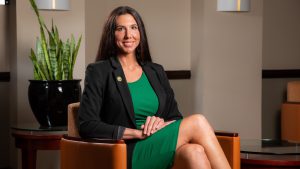
Jessie Stomski Seim ’08 is general counsel for the Prairie Island Indian Community.
Jessie Stomski Seim ’08 is convinced she would have never attended law school or become general counsel for a tribal government if not for the scholarship she received to play basketball at the University of Wisconsin.
With the NCAA Women’s Final Four coming to Minneapolis in April, Stomski Seim, a citizen of the Muscogee (Creek) Nation of Oklahoma, is using her position as a member of the local organizing committee executive board to raise awareness of the dearth of Native student-athletes.
“Native student-athletes are not getting recruited,” said Stomski Seim, who works for the Prairie Island Indian Community. “And even when they are, there’s a retention issue. If they come from tribal communities, the culture shock of going to a campus can be significant.
“Supporting those students is equally important.”
As important as basketball and sports are for many tribal communities, barely one percent of all NCAA student-athletes are Native. In Minnesota, for example, Red Lake High School has enjoyed success on the basketball court, earning several trips to state tournaments for both the boys’ and girls’ teams. But it wasn’t until 2019 that the first Red Laker – Grace White – earned a scholarship to play Division I college basketball.
Stomski Seim’s career at the University of Wisconsin earned her an induction into the program’s hall of fame. She was also drafted in the 2002 WNBA draft and played professionally in France and Greece. “Physical competition was part of our traditions long before contact with Europeans, and basketball is good medicine for me.”
Stomski Seim has worked to secure programming at the Women’s Final Four, including a halftime show that showcases Minnesota’s tribal culture; in-game videos that highlight former Native women student athletes discussing the need for more opportunity; a basketball clinic for Native youth; a WBCA clinic for coaches who recruit athletes; and 300 tickets for Native youth to attend.
Long term, Stomski Seim hopes to see a culture change in the way college coaches recruit high school athletes. She notes tribal reservations are often several hours from city centers, which means less opportunity for athletes to be seen. But Stomski Seim says the NCAA can also be part of efforts to support students on the ground. “If you don’t have somebody who can drive you to practice, that’s a barrier,” she said. “A lot of these efforts take money, and we have to support the people in tribal communities who are willing to do that work to encourage those young people to stay with it.
“Sports isn’t for everyone, but we know from research there are so many benefits to kids who play sports, and it’s time away from things that are unhealthy.”
The 2022 Women’s Final Four will be played April 1 and 3 at the Target Center in downtown Minneapolis.
